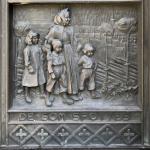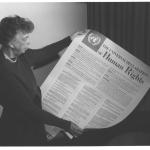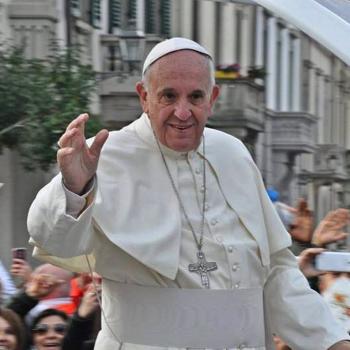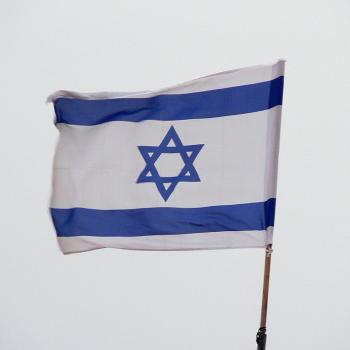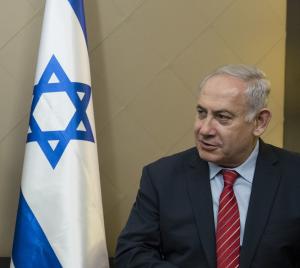
War is hell. War is never a good thing. Even when it is justified, it is not a good thing. We must never think of war as being good, even if sometimes it is the only way to protect and defend the greater good. The good which is achieved in a just war certainly should be recognized, but that good must not be confused with the war itself. Peace, true peace, must always be what is desired, even when at war. Peace, and what is necessary to build it, must influence the way war is waged. Even if someone begins a war justly, that does not mean they will always be in the right in what they do; they can lose their just cause if they act unjustly (or, the cause can remain just, but some involved in the conflict can be deemed as committing wrongs, and if they hold positions of power, they should be replaced). War cannot be seen as a free for all. Civilians cannot be directly attacked. Refugees must be given protection. The humanity of the enemy must never be denied. War, for it to be just, must possess more than a just cause; it must be waged in a just manner, and those waging the war must possess a legitimate chance of success.
The Catechism of the Catholic Church explains the general expectations for a just war:
2309 The strict conditions for legitimate defense by military force require rigorous consideration. The gravity of such a decision makes it subject to rigorous conditions of moral legitimacy. At one and the same time:
– the damage inflicted by the aggressor on the nation or community of nations must be lasting, grave, and certain;
– all other means of putting an end to it must have been shown to be impractical or ineffective;
– there must be serious prospects of success;
– the use of arms must not produce evils and disorders graver than the evil to be eliminated. The power of modern means of destruction weighs very heavily in evaluating this condition.
These are the traditional elements enumerated in what is called the “just war” doctrine.
The evaluation of these conditions for moral legitimacy belongs to the prudential judgment of those who have responsibility for the common good.
A just war must be a defensive war. It must have a limited end. Its goal must be for the greater good, and it must be waged in order to produce it. All practical attempts to prevent the war must be tried. The war must not be an impossible one to win (because, if it is, all it will do is produce evil after evil, and either it will be a never-ending war which will produce more and more evils, or else, it will end, and all the evil done in war will outweigh any potential good attained).
It is extremely important that the response to aggression is not something significantly worse than the initial act of aggression itself. It would be wrong to use a nuclear bomb on millions of people to stop a few thousand people from waging ground warfare, especially if those waging such ground warfare can be stopped with much less force. It would be wrong to deny basic humanitarian needs to civilians, such as food and water, justifying it by saying their leaders are at fault for the war so only their leaders are culpable for it (that would be like saying police can kill hostages to take out hostage takers and they are not culpable for their actions because they were not the hostage takers; when dealing with a hostage situation, police are expected to do all they can to save the lives of the hostages, and even, the hostage takers if possible). Indiscriminate killing of civilians in war will only make those civilians feel as if they must defend themselves and fight, making the moral accounting of the war itself much more difficult to address. This is why St. Thomas Aquinas, a key representative of the just war tradition, said that the justice of a war can be corrupted, if those who are engaging the war engage evil deeds, rendering such a war unjust (or at least, that portion of the war unjust): “For it may happen that the war is declared by the legitimate authority, and for a just cause, and yet be rendered unlawful through a wicked intention.”[1]
In war, the ends never justify the means. Those who have been unjustly attacked have a right to defend themselves, but they must do so with the proper means. That is where the notion of proportionality comes into play in just war theory. Excessive use of force undermines the justice of the war. Indeed, it actually undermines the proper goal of war, which is the promotion of the greater good, because it accepts and chooses a greater evil. Certainly, we must accept the principles will be difficult to follow, and mistakes will be made; war will always be waged imperfectly. We understand that in the heat of battle, people often have lost their reason and the freedom necessary to be culpable for their actions. In such a situation, certain amounts of excessive force, which should not have been embraced, will not mean the justice of the war is entirely undermined, though it will mean there will be some corruption of that justice which will have to be accounted for. Nonetheless, every effort must be made to make sure that does not happen and those responsible for war crimes pay for them. Those who have not engaged excessive force will not lose their right to self-defense just because others might have done so, which is also why it is possible for a war to continue to be just even if a portion of it can be shown to be unjust, and those involved in such actions are proven to be war criminals (we can see this in World War II, where the Allies had a just cause, and the war was mostly just, though many actions in it were not). Sometimes, those who engage in excessive force, especially if they do so knowingly and with full intention to produce as much evil as possible, can change the situation in a war so that, at least temporarily, those who once were aggressors might have a limited right to self-defense. To understand this point, all we need to consider is the way a criminal, such as a thief, can be legitimately put under arrest, but if the police officer who arrests them tries to kill them instead of taking them to jail, the criminal, who normally would not have a right to get away from the officer, would be justified in trying to get away and even defend their lives.
The fact that just wars require justifications for actions which are normally prohibited means that some might, due to their conscience, be unable to engage such actions, and insofar as their conscience leads to such an objection, they should not comply. Pacifists who engage conscientious objection to war represent an important sign, one which tells us that all wars are evil. Their conscientious objection should help society keep in mind the goal they should have, which is peace, and the desire to create a just and lasting peace, one which looks to the causes of a particular conflict and finds the ways to make sure those causes no longer exist (if possible). On the other hand, this does not mean society cannot defend itself when unjustly attacked. Indeed, there are times when it is necessary. If some great evil aggressor is not confronted and stopped, the evil will only fester and grow, producing a greater evil than that what would be produced by a just war. When such a situation arises, a person must follow their conscience. Those who will not fight in a particular justified war can and should do other things to confront the evil before them, making sure their sign about the evils of war does not become a sign which ends up supporting and justifying greater evil (which, sadly, is what we see happening by those who think Putin should be free to do as he wishes, even if it means he will invade other European countries). The good of peace, the good found in true peace, must be one of the intentions of a just war. This is why it is important to have those who stand for peace and cannot fight in wars themselves to speak up about the evils of war, so that they can remind everyone what it is which should be sought, but they must be consistent and decry invaders and not just defenders in a war.
In relation to the conflict between Israel and Hamas, these considerations are important. Hamas often tries to justify itself by the mistreatment and abuse they feel Palestinians are receiving from Israel. They are, of course, wrong; their actions are not justified, because they fail in relation to just war expectations: not only are the expectations of proportionality not met, they do not have the likelihood of success. Indeed, their actions are outright brutal war crimes which must be condemned, making them unjust aggressors even if there are legitimate grievances Palestinians have in relation to the way they are treated by Israel (such as the way Israel defends settlers coming into their lands, or in the way Israel has blocked humanitarian needs, like medicine, coming into their territory). The evils committed by Hamas and their supporters, which must not be equivocated with all Palestinians, justifies Israel defending itself from aggression, but not for Israel to respond in kind, engaging in disproportionate means and war crimes to deal with Hamas (such as bombing a refugee camp or denying humanitarian aid).
One can be and should be critical of Hamas, and the evils they do, while recognizing innocent Palestinians have rights which must be respected and defended. One can and should accept that Israel has a right to defend itself without coming to believe that Israel can use any means they want to do so. One can be critical of what Israel’s leaders have done in regards to Palestinians without denying Israel’s right to self-defense, just as one can recognize the rights of Palestinians to justly resist the evils they face.
One should not attribute the evils done by the state of Israel with all those living in Israel, or all Jews; to do so is to disengage from a proper, thoughtful analysis and instead engage antisemitic propaganda. One should not attribute all the evils done by Hamas with all Palestinians. Both responses are dangerous and dehumanizing, and represents attempts to justify disproportionate actions in war.
Dangerous statements made by Netanyahu which suggest the only response is to engage mass extermination, which is the implication of his words when he says he is in a situation similar to Saul and Amalek, must be decried and the actions suggested by them stopped. All of Israel does not stand behind him and his excessive reactions, indeed, many stand against him while supporting the proper defense of Israel. Netanyahu and his supporters must be judged for those actions, not all the Jews or Israel. Similarly, we should not judge all Palestinians by statements made by Hamas and their supporters.
We must not allow ourselves to dehumanize innocents who are suffering as a result of war. We must recognize there are innocents on both sides of the conflict, innocents who we must do our best to protect and support. This is why humanitarian aid for Palestinians, and with it, attempts to bring an end to the conflict with a cessation of violence from all sides, is important, though it is understandable if some do not think now is the time for a cessation of hostilities as the danger and evil involved has not been stopped. Even if such a cessation is not presently viable, Israel must follow legitimate war tactics, doing its best to limit the harm which is done to the innocents involved.
In the end, we must stand with the innocents involved in the war; we must stand with Israel, even as we must stand with the innocent Palestinians. We must not let our support of Israel allow Israel to engage war crimes, nor must we allow our support of innocent Palestinians lead us to ignore the threat which Israel faces and has to deal with. We must recognize the actions of Hamas are unacceptable, indeed, represent grave evils (who can ever justify rape?!). We must stand with Israel and with the Palestinians, working for the good of both of them, criticizing injustices while working to overturn them so we can affirm the rights of all.
Acknowledging injustices must be done with care and concern, indeed, with a love for humanity as a whole. This will make sure our response does not come out of biases and prejudices, such as antisemitism or hatred for all Muslims or Palestinians, but rather, out of a desire for peace, the greater good, and the general welfare of all. This is why, when dealing with a difficult situation like the conflict between Israel and Hamas, it requires a delicate response, one which admits the evils innocents have suffered on all sides without using such evils to justify greater, worse evils. We must recognize those who have a just cause to defend themselves might have some blame for the situation, and in dealing with the aftermath of the war, grievances from all sides must be met and dealt with so that they do not fester and become worse, making for subsequent (and worse) conflicts in the future. We must desire peace, a peace which recognizes and embrace restorative justice. The aftermath of World War I, and the failure to engage restorative justices, led to World War II. The aftermath of World War II was different, because that lesson was learned. Let us hope that lesson can be learned again, so that, once the conflict between Israel and Hamas is over, both sides can finally come together and work out a just peace.
[1] St Thomas Aquinas, Summa Theologica (II-II q40 a1).
Stay in touch! Like A Little Bit of Nothing on Facebook.
If you liked what you read, please consider sharing it with your friends and family!
N.B.: While I read comments to moderate them, I rarely respond to them. If I don’t respond to your comment directly, don’t assume I am unthankful for it. I appreciate it. But I want readers to feel free to ask questions, and hopefully, dialogue with each other. I have shared what I wanted to say, though some responses will get a brief reply by me, or, if I find it interesting and something I can engage fully, as the foundation for another post. I have had many posts inspired or improved upon thanks to my readers.


